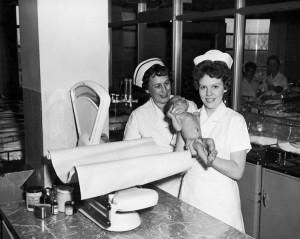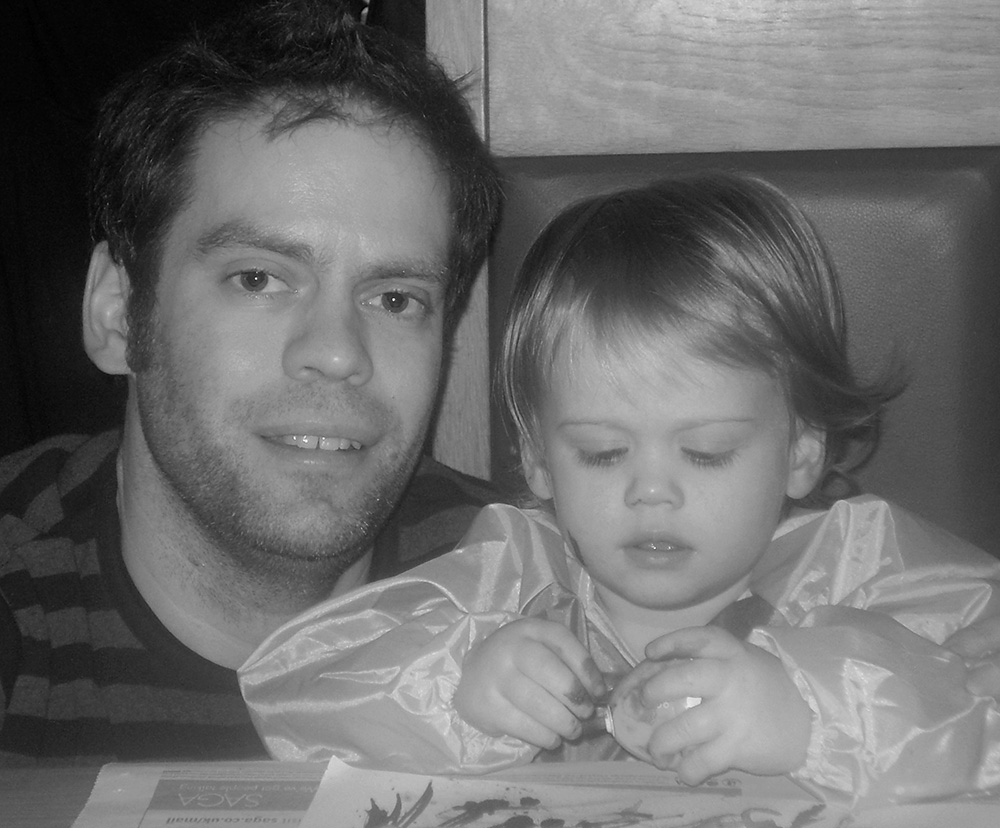
When I was made aware of the Fatherhood Insititue’s #DadsExcluded campaign, an example instantly sprung to mind. It’s a place where most men spend very little time; the maternity ward.
The majority of men only spend a day on the ward so they probably don’t notice just how dad-unfriendly these places are. I didn’t really notice until my youngest daughter was born 18 months ago and before the memories fade, I think it only correct I make a record of them.
Let me start by saying that I have absolutely no issues whatsoever with midwives. I’ve never, and I wish to make this totally clear, had an issue with a midwife or a health visitor. I’m also not going to question the way care is provided in maternity wards. They exist to help women after giving birth and by-rights must be a predominately female focused environment. To argue otherwise would be moronic.
Before I go on, allow me to give you a little back-story. When my youngest daughter, Elizabeth, was born it was a text-book delivery. We went home as a family soon after the birth. Complications arose a couple of days later when a visiting midwife noticed symptoms of possible eclampsyia and my wife was re-admitted to hospital for further checks and to stabilise her blood pressure.
Thankfully it was all a false alarm and she was discharged a few days later. It was, however, a disappointing and very stressful start to our life as a new and expanded family.
Being re-admitted to hospital was the last thing my wife needed after the birth. It was very hard for her emotionally. She needed support and so I spent every possible minute I could with her on the maternity ward.
It was during this elongated stay I noticed bad planning and poor policies that discriminated against us dads. I’ll list a few of my observations here:
No gents’ lavatories on the ward
This may seem a very petty complaint, but every time I needed the lavatory I had to leave the ward. This was the easy part. The difficult bit was regaining entry on my return. I had to press a buzzer and wait for a midwife to let me back in. They were generally very good at this, but sometimes you could end up waiting ages to for someone to notice you. I don’t question the need for the tight security, but is it really too much to install a male WC on the ward?
Men, Do not look after your new born child!
Each lunchtime and dinner time, all women capable of walking had to make their way to a communal dining hall to eat. Men were not allowed to accompany their partners. The policy was that women must take their baby(ies) with them, even if the father was visiting.
This sends a message to men that they aren’t capable of looking after their own child. As this was my second child, I found it incredibly patronising because I knew how to look after a new born.
I totally understand that some men would struggle with this (as do many women), but if you are not put in a position where you have to look after your offspring, you’ll never learn. Also, where’s the harm in giving mum 30 minutes without baby while she eats?
Men, do not eat!
Whenever I wanted to eat, I was rusticated to the hospital restaurant. This involved walking quite a long way through a hospital in the midst of a norovirus outbreak. Every time I ate I wondered if I was brining horrible germs back with me and, you guessed it, a midwife had to stop what she was doing to let me back on to the ward.
Men, do not drink!
A couple of times a day, a midwifery assistant would come around the ward with tea and coffee for the women. Woe betide any man who inadvertently asked her for a drink. You would receive nothing but a mug full of attitude in response.
Purely by luck, I found a way around this. My wife doesn’t drink tea and didn’t like the coffee on offer. Every time drinks were offered, she asked for a tea that I then drank in the privacy of our own little cubicle.
The solution to both these issues is simple. This is the NHS, I don’t expect to get food and drink for free. Just allow us guys to pay for food and drink that we can then consume in the communal dining room (or equivalent). This way we can stay with our partners and new born children, won’t have to burden a midwife with the responsibility of playing bouncer and letting us on to the ward and the NHS can make a profit on what we buy.
NHS trusts are superb at making money from numerous sources; car parking, Bounty franchises, fast food restaurants, baby scan pictures, clay models of your child’s feet. Hospitals are a bit like souks these days! This would simply add to the commercial mix.
In summary
In isolation, none of these points may seem terribly serious. Imagine, however, that you’re a man keeping his partner company. She’s just given birth, there are complications and she is clearly upset, possibly depressed. Every time you go off for lunch she asks you to come back as quickly as you can because she doesn’t want to be on her own.
Dad has a very important role to play in these circumstances. Mum needs you and so does the new born child. Sadly, my experience suggests this role isn’t recognised on the maternity ward and so we don’t get the chance to fulfil it.
The Fatherhood Institute is collecting examples of fatherhood exclusion as part of its Dads Excluded twitter campaign. For more information, follow the #DadsExcluded hashtag.
Photo Credit: Library and Archives, Canada. Reproduced under Creative Commons License







21 thoughts on “Dads; excluded from the maternity ward #DadsExcluded”
Five years ago, after the birth of my first, I’d have agreed with you on this. But then our crumbling Victorian hospital was replaced by a multi, multi million pound new one, one of the last PPI projects under Labour. Here, at Pembury Hospital, we’ve had our other two, including the latest and last at the weekend. And I’m glad to say that of the points you raise above, only the one about food applies, and I’m cool with that.
Aside from a period during the actual birth when the focus was 100% on my wife, it was definitely #DadsIncluded; my daughter was passed to me within moments of the birth, for instance, and I was the one who dressed her.
I think this was in part structural – toilets, private rooms, communal room with refreshments – but also cultural. The vast majority of the many staff we met included me in the conversation. Now this may well be because, after three, I can talk a good game about breastfeeding. But my experience, and it only that, suggests that when the right facilities and culture is in place, dads can be as much a part of the experience as biology allows.
Great blog, John. As you rightly suggest, sometimes it’s a cocktail of small obstacles, negative attitudes and thoughtless policies that, taken together, add up to a sense that we’re just not welcome on maternity wards. Given the strength of the evidence on fathers’ impact on mothers and children (let alone men’s own discomfort) this is pretty shocking. This is not a men vs women issue – new mothers themselves want services to engage more effectively with dads. The more we tell stories like this through #DadsExcluded, the we can lobby those who commission/deliver maternity services to grasp the nettle and become more father-inclusive.
Thanks Matt for commenting. You raise a valid point and I wish to be explicit in my response; midwives, doctors and health visitors were always marvellous (that applies to both my daughters’ births). I could not and would not fault them, I was always included and I can think of two occasions when doctors singled me out for my opinion on significant issues.
Unfortunately it is my experience some outdated policies and practices still linger on. If this is simply a case of hospital facilities needing upgrading then it will only be a matter of time before this is rectified.
The disparity of our experiences, and that of the commenters below, shows that there’s no coherent policy nationwide. And that’s just…weird. One of many the benefits of a *National* HS must surely be the ability to co-ordinate and share best practice, something that would be much harder to do with a fragmented, privatised system (look no further than rail travel).
Yet it doesn’t appear that this is happening, and as you infer, that’s not just about facilities, it’s about attitudes, training and culture. Awareness will help I’m sure, but suggest that needs to be focused around tangible changes. For example, make it officially sanctioned in all hospitals that fathers can come and go, regardless of visiting hours (as it is at our hospital). Then many of the other smaller niggles will be resolved, by necessity or because the needless imbalances are plain for all to see.
Thanks Mat. I’ve found the comments here very enlightening. It seems there’s a real hotch-potch across the NHS with some hospitals having a very inclusive attitude while others fall short of this. It’s much more varied than I was expecting!
Thanks for commenting Jeremy. Always good to hear from the Fatherhood Institute. I hope the campaign goes well.
There are huge benefits to the Mum too. I’ve had 2 far from textbook deliveries so had to spend several days on the ward afterwards. The first time my husband was shooed away after visiting hours and I was left alone upset, unable to move and feeling extremely vulnerable. I didn’t sleep for 5 days straight (and yes you do start hallucinating)
After my second my husband was allowed to stay 24/7 he had to sleep in a chair so not great for him but hugely reassuring for me and meant I wasn’t waiting ages for a call button to be answered when I needed pain meds, baby passing to me, help to get to the loo.
There are reasons I had children with this man, when I’m exhausted and in pain I want him there and I want him to see those first few days of our child’s life too.
Now this is a very important point. I’ve had some comments on twitter today from individuals that don’t get the importance of dad being around to help after the birth. It is beneficial for baby, mum and dad. It must surely take huge strain off of NHS resources if dad is available to help pass baby or walk his partner to the lavatory. who else is going to do it, a nurse or midwife who is inevitably going to be under huge pressure?
And that’s before we get on to the other point you made about finding your partner’s presence re-assuring! There’s so much to this issue.
When my daughter was born, almost five years ago now, we were lucky enough to have a nice room with ensuite for the delivery. Once my other half was showered and recovered enough to move from the room, we were ushered into a small maternity ward. Four beds only. My other half was settled into one of the beds, our daughter (first child) was settled next to her, and after 2 minutes I was asked to leave. It wasn’t visiting hours and I wasn’t allowed to be in the ward… Without wanting to raise a scene, I politely suggested that this was vital bonding time, and that I had a right and a need to bond with my daughter, I also asked whether the other mums in the ward would mind. I was told once more that I would need to leave as it was not ‘visiting’ hours. My girlfriend asked that I stay, we were told it was not allowed. So, without wanting to cause undue stress, I had to leave my daughter of only an hour so old, and my girlfriend, who wanted my support and comfort, and had to go and sit downstairs for 2 hours until visiting time began again. From the highs and joys to the lows in one foul swoop.
Ouch, that must have been quite a come down. My second daughter was born outside of visiting hours but I was allowed to stay on the ward. I think you’ve provided a very powerful example of how men should be included in the whole process.
The post natal ward where I spent a week last month has ‘visitors’ bathrooms complete with showers, and there was no communal dining situation at all.
I agree about the tedious buzzer waiting. I was up and down to SCBU every 3 hours and it did sometimes take an age to get in and out, but I guess security is the most important thing.
I wouldn’t question the need for security at all. As yo may very well have experienced, if you’re on a ward for a protracted length of time and every time you need to leave it, you have to wait to get back in, well, it takes a lot of time out of your day! This is far from ideal if you’re there to offer support to a woman who has just given birth and is in a bad place emotionally. That’s my experience anyway!
I was the first to hold my son when he was born and put on his first ever nappy. Both of these things were encouraged by the midwife. I was included at every opportunity and i was asked for my opinion every time decisions needed to be made. I was frustrated by visiting hours and security buzzers but also recognised that both are there for a reason.
I don’t see the point of the Dads Excluded campaign when the NHS is facing far bigger issues. Why not campaign to stop the NHS being privatised instead? All of the issues you highlight would be solved by better funding and facilities.
Thanks Andy for stopping by. I should clarify the Fatherhood Institute is looking for any examples of fatherhood exclusion, it was my choice to write about my experiences in an NHS hospital.
I have no complaint about security buzzers or visiting hours. I appreciate both are necessary. I have always found the health professionals of all ranks and specialisms to be inclusive in their approach, but it seemed to me they were, often reluctantly, having to enforce policies that did nothing to help or encourage the father in his role from day one. It’s also clear from reading the comments left here that some hosptials are clearly excellent at including fathers.
Hi Andy
The point of #DadsExcluded is that if we do nothing to create an environment in which parenting is seen as men’s as well as women’s business, we can’t then turn around and complain about the gender pay gap, children losing touch with their fathers post-separation etc etc. This is the 21st century and tax-funded institutions need to work harder to address the needs of modern families.
Of course there are bigger issues – people are starving – but this stuff does matter.
Jeremy
That is the point I’m making. There are no barriers. If men want to get involved, they get involved. There is nothing to stop us. NHS is being sold off and you feel this is a better use of your time.
Totally agree with this, I had to stay in for almost 2 days after my daughter was born. My poor hubby had to sleep in an uncomfortable chair, I ended up giving him most of my pillows so he could get comfy! There was no where for him to get food or drink without going for miles and there wasn’t even a bathroom he could use to freshen up. We had a few snacks with us but mostly I shares my meals and drinks with him (like you say, we’d have been happy to pay but there just wasn’t the option) We will be packing extra this time just in case 🙂 x Char
#MMWBH
http://charlotteskitchenblog.blogspot.co.uk/
My youngest child is now 11 so I don’t have any current experience of maternity wards but this certainly wasn’t the case when I had my children so I think it really does depend on particular hospitals and probably also on the particular staff on duty. I have experienced disparities when children have been in hospital for treatment too. I’m not sure you can ever really get round the fact that different staff will interpret policies in different ways.
What an amazing post John, and you’ve made some really good points and I’ll admit…being the Mother, I never noticed those things! But now you’ve made them known I’m like “Oooh yeeeaaahh!”.
Why isn’t their a male WC on the ward? Why don’t they get offered a wee cup of tea when the Mum does and so on. You’re completely right. You’re a family and should be treated as such!
However on the ‘Mums having to take their babies for food thing’ I have had to do this on many occasion and the only reason I can think of is to help us adapt to juggling babies and normality {if those two can co-exist! haha}.
Excellent post though and as always thanks so much for linking up to #MMWBH and good luck for the BIBS!
This is why I’ve chosen home birth for my previous 2 children and my next child. It’s so unnatural and completely unnecessary to separate families at this special time. It’s awful that we don’t all get the same choices when it comes to how we want our children’s lives to begin. We’ve lost our way somewhere along the line, and for what benefit?
Pingback: Birth stories told by dad Pt1 | Dad Blog UKBirth stories told by dad Pt1 - Dad Blog UK